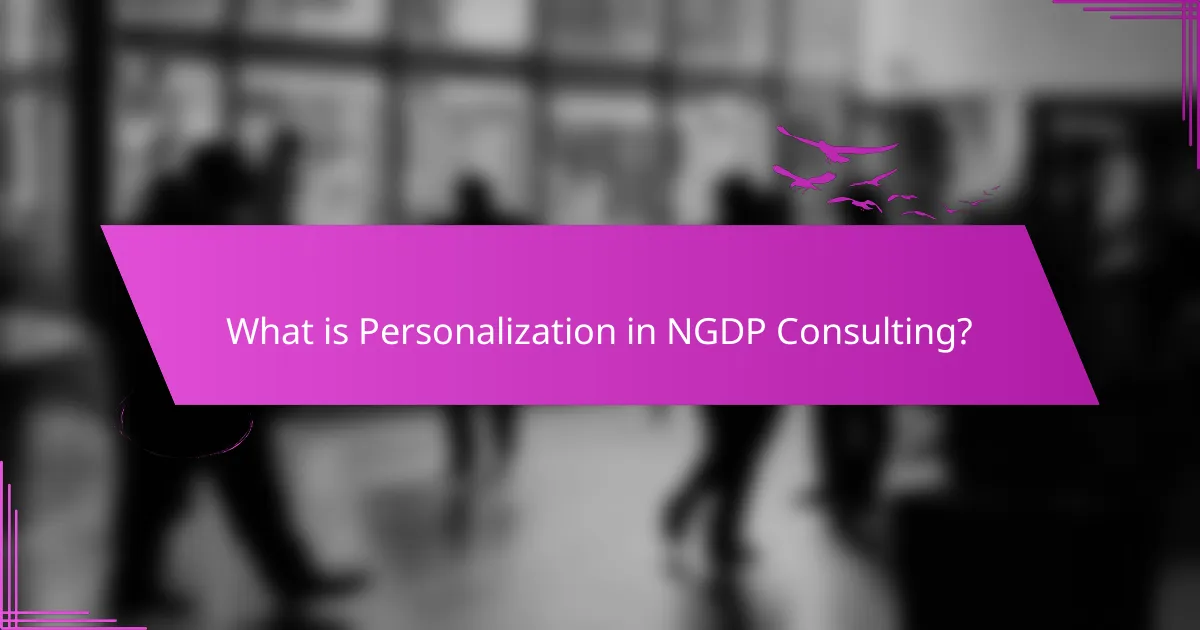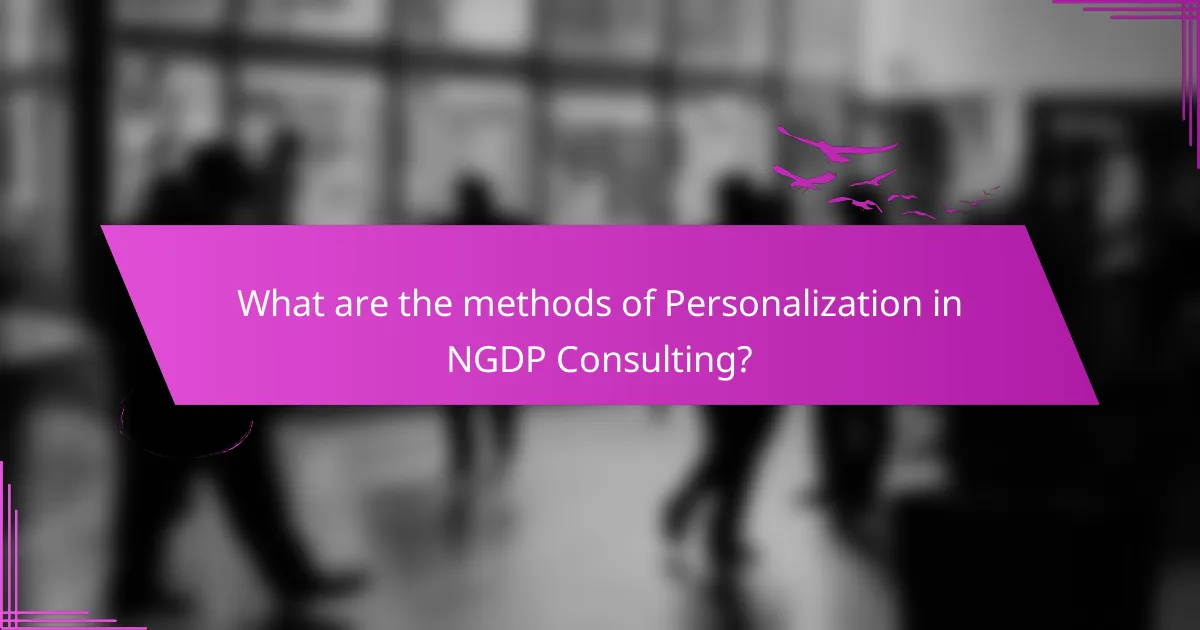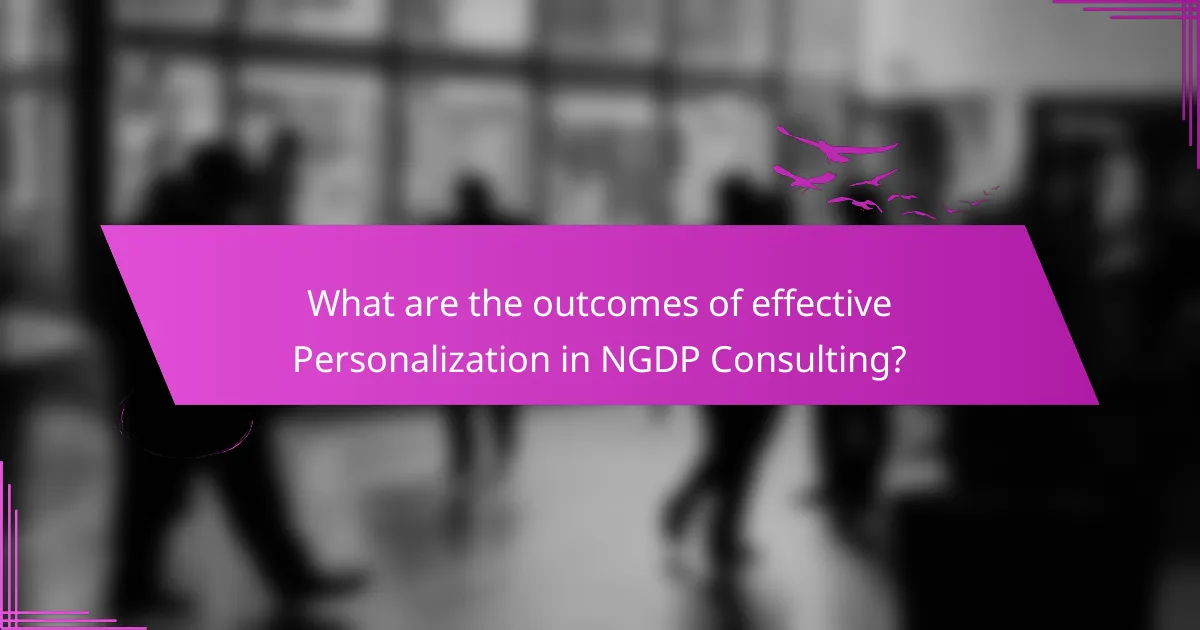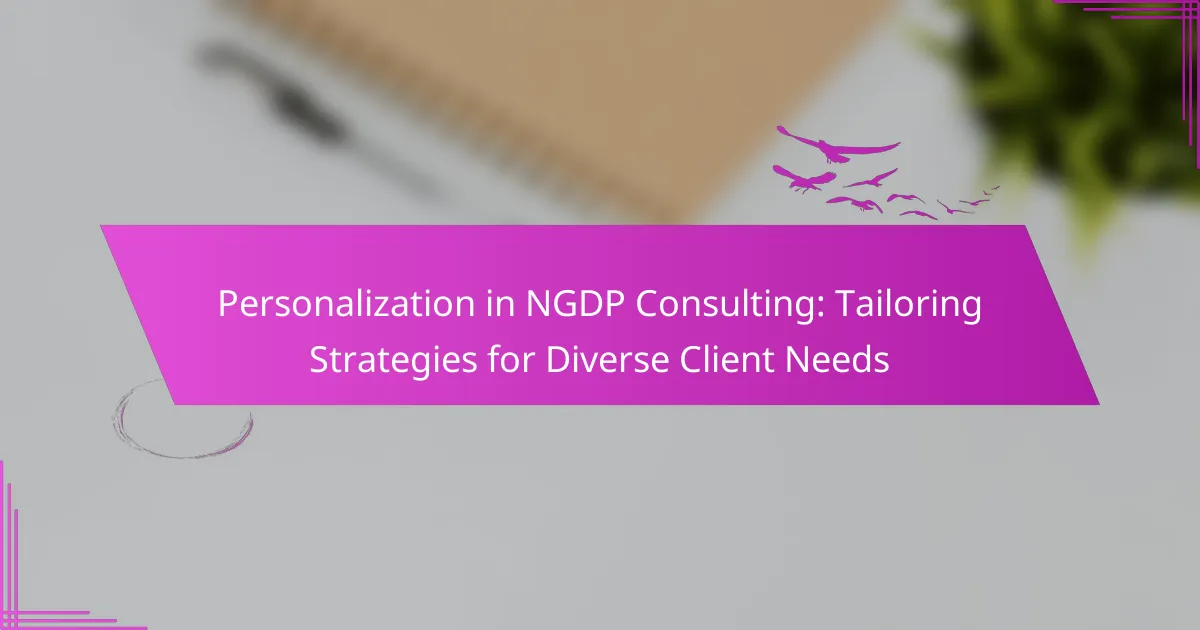
What is Personalization in NGDP Consulting?
Personalization in NGDP Consulting refers to the customized approach taken to meet individual client needs. This strategy involves assessing unique client challenges and goals. NGDP Consulting utilizes data analysis to tailor solutions effectively. Personalization enhances client engagement and satisfaction. It also improves the overall effectiveness of consulting services. Research shows that personalized strategies lead to better outcomes in client relationships. By focusing on specific client attributes, NGDP Consulting ensures relevant and impactful solutions.
How does Personalization enhance NGDP Consulting strategies?
Personalization enhances NGDP Consulting strategies by allowing tailored solutions that meet specific client needs. Customized approaches lead to improved client satisfaction and engagement. Personalization fosters stronger relationships between consultants and clients. It enables the identification of unique challenges faced by each client. By analyzing individual client data, consultants can craft relevant recommendations. This targeted strategy increases the effectiveness of implemented solutions. Studies show that personalized consulting can boost client retention by up to 30%. Overall, personalization drives better outcomes for both clients and consultants.
What are the key elements of Personalization in consulting?
The key elements of personalization in consulting include understanding client needs, tailoring solutions, building relationships, and utilizing data. Understanding client needs involves thorough assessments and active listening to capture unique challenges. Tailoring solutions means customizing strategies to fit specific client situations and goals. Building relationships fosters trust and ensures ongoing communication. Utilizing data helps in making informed decisions and predicting client preferences. These elements collectively enhance the effectiveness of consulting engagements.
How does Personalization impact client engagement in NGDP Consulting?
Personalization significantly enhances client engagement in NGDP Consulting. Tailored strategies foster a deeper connection between consultants and clients. This approach addresses individual client needs and preferences. Personalized interactions lead to higher satisfaction rates. Research shows that businesses employing personalized marketing see a 20% increase in sales. Clients feel valued when their unique challenges are acknowledged. Engagement metrics improve as clients are more likely to respond positively. Overall, personalization is a key driver of successful client relationships in consulting.
Why is Personalization important for diverse client needs?
Personalization is important for diverse client needs because it enhances client satisfaction and engagement. Tailored approaches address individual preferences and requirements. This leads to improved outcomes and stronger client relationships. Research indicates that 80% of consumers are more likely to make a purchase when brands offer personalized experiences. Personalization also increases client loyalty and retention rates. In diverse client bases, understanding unique cultural, social, and economic backgrounds is critical. This ensures that strategies resonate with each client’s specific context. Ultimately, personalization drives success in consulting by aligning services with client expectations.
What challenges do clients face without personalized strategies?
Clients face several challenges without personalized strategies. These challenges include ineffective solutions that do not address specific needs. Generic approaches often overlook unique circumstances of each client. As a result, clients may experience poor outcomes and low satisfaction. Without tailored strategies, clients struggle to achieve their objectives efficiently. This leads to wasted resources and time. Furthermore, clients may feel undervalued and disengaged. A lack of personalization can hinder long-term relationships and trust. Overall, the absence of personalized strategies significantly limits client success and growth.
How does Personalization lead to better outcomes for clients?
Personalization leads to better outcomes for clients by tailoring services to individual needs. This approach enhances client satisfaction and engagement. Personalized strategies often result in higher retention rates. According to a study by Deloitte, 80% of consumers prefer personalized experiences. Customization allows for more relevant solutions, addressing specific client challenges. This relevance increases the likelihood of achieving desired results. Additionally, personalized communication fosters trust and loyalty. Clients are more likely to act on recommendations that resonate with their unique situations. Overall, personalization significantly improves client outcomes by aligning services with their distinct preferences and goals.

What are the methods of Personalization in NGDP Consulting?
NGDP Consulting employs various methods of personalization to meet client needs effectively. These methods include customized assessments, tailored strategy development, and ongoing feedback mechanisms. Customized assessments gather specific client data to inform personalized solutions. Tailored strategy development focuses on creating unique action plans based on individual client goals. Ongoing feedback mechanisms ensure continuous improvement and adaptation of strategies. This approach enhances client satisfaction and outcomes. The effectiveness of these methods is supported by client testimonials and case studies demonstrating successful personalized interventions.
How can data analytics be used for Personalization?
Data analytics can be used for personalization by analyzing customer data to tailor experiences. It identifies individual preferences and behaviors. This enables businesses to deliver targeted content and recommendations. For instance, e-commerce platforms use analytics to suggest products based on past purchases. According to a study by McKinsey, personalized experiences can lead to a 10-30% increase in revenue. Furthermore, data analytics helps in segmenting audiences for more effective marketing strategies. By leveraging insights, companies can enhance customer satisfaction and loyalty.
What types of data are essential for effective Personalization?
Essential data for effective personalization includes demographic data, behavioral data, and psychographic data. Demographic data provides insights into age, gender, income, and location. Behavioral data tracks user interactions, such as browsing history and purchase patterns. Psychographic data reveals user interests, values, and lifestyle choices. Together, these data types enable tailored experiences that meet individual client needs. Research indicates that personalized marketing can increase engagement by up to 74%, highlighting the importance of these data types in achieving effective personalization.
How does data analysis inform tailored consulting strategies?
Data analysis informs tailored consulting strategies by providing insights into client needs and behaviors. It enables consultants to identify patterns and trends specific to each client. By analyzing data, consultants can segment clients based on various attributes. This segmentation allows for customized recommendations that align with client objectives. Furthermore, data analysis helps in measuring the effectiveness of implemented strategies. It provides feedback that can refine future consulting approaches. Research shows that companies using data-driven strategies improve client satisfaction by 20%. This evidence supports the effectiveness of data analysis in consulting.
What role does client feedback play in Personalization?
Client feedback is essential for effective personalization. It helps businesses understand individual client preferences and needs. By analyzing this feedback, companies can tailor their services accordingly. Personalization enhances client satisfaction and loyalty. Research shows that 80% of consumers are more likely to make a purchase when brands offer personalized experiences. Feedback mechanisms, such as surveys and reviews, provide valuable insights. These insights enable continuous improvement of personalized strategies. Thus, client feedback directly influences the success of personalization efforts.
How can consultants gather and utilize client feedback effectively?
Consultants can gather and utilize client feedback effectively by employing structured methods such as surveys and interviews. These tools allow consultants to obtain direct insights from clients about their experiences. Surveys can be distributed after project milestones to capture immediate reactions. Interviews provide an opportunity for in-depth discussions, revealing nuanced feedback.
Consultants should also implement feedback loops, ensuring clients know their input is valued. Regular check-ins can help maintain open communication channels. Analyzing feedback quantitatively and qualitatively enables consultants to identify trends and areas for improvement.
Utilizing feedback can lead to tailored strategies that better meet client needs. For instance, adapting service offerings based on client preferences can enhance satisfaction. Research shows that organizations that actively seek and act on client feedback see a 10-15% increase in client retention rates.
What are the best practices for integrating feedback into strategies?
Best practices for integrating feedback into strategies include establishing a structured feedback collection process. This process should involve regular surveys, interviews, and focus groups to gather insights. Analyze the feedback systematically to identify common themes and actionable points. Prioritize changes based on the impact and feasibility of implementation. Communicate the changes made in response to feedback to stakeholders. This transparency builds trust and encourages future feedback. Regularly review and refine the feedback integration process to ensure its effectiveness. According to a study by the Harvard Business Review, companies that effectively integrate feedback see a 30% increase in employee engagement and satisfaction.

What are the outcomes of effective Personalization in NGDP Consulting?
Effective personalization in NGDP Consulting leads to improved client satisfaction and engagement. Tailored strategies address specific client needs and preferences. This approach fosters stronger client relationships and loyalty. Personalized consulting enhances the relevance of solutions provided. Clients experience greater value from customized services. Research shows that personalized experiences can increase client retention by up to 30%. Ultimately, effective personalization drives better business outcomes for both consultants and clients.
How does Personalization improve client satisfaction?
Personalization improves client satisfaction by tailoring experiences to individual preferences. When clients receive customized services, they feel valued and understood. This approach fosters a stronger emotional connection between clients and service providers. Research shows that 80% of consumers are more likely to make a purchase when brands offer personalized experiences. Additionally, clients report higher satisfaction levels when their specific needs are addressed. Personalization can lead to increased loyalty and repeat business. By analyzing client data, businesses can create targeted solutions that resonate more effectively. This strategic alignment enhances overall client experiences and satisfaction rates.
What metrics can be used to measure client satisfaction levels?
Client satisfaction levels can be measured using several key metrics. Common metrics include Net Promoter Score (NPS), Customer Satisfaction Score (CSAT), and Customer Effort Score (CES). NPS assesses the likelihood of clients recommending a service, providing insight into overall satisfaction. CSAT measures clients’ satisfaction with specific interactions or services, often through surveys. CES evaluates how easy it is for clients to accomplish their goals with a service, indicating potential friction points. These metrics are widely used in various industries to gauge client experiences and satisfaction effectively.
How can improved satisfaction lead to long-term client relationships?
Improved satisfaction fosters long-term client relationships by enhancing trust and loyalty. Satisfied clients are more likely to engage in repeat business. They tend to refer others, expanding the client base. Research shows that 70% of satisfied customers will recommend a brand. Trust builds as clients experience consistent quality and service. This leads to increased retention rates, which are crucial for business growth. Long-term relationships often result in higher lifetime value per client. Personalization in services can significantly boost satisfaction levels, creating a competitive advantage.
What are some common pitfalls in Personalization strategies?
Common pitfalls in personalization strategies include over-segmentation, lack of data integration, and ignoring user feedback. Over-segmentation occurs when businesses create too many narrow customer segments, leading to ineffective targeting. Lack of data integration results in disjointed customer experiences, as information from different sources is not synchronized. Ignoring user feedback can cause brands to miss critical insights needed for effective personalization. A study by Epsilon found that 80% of consumers are more likely to make a purchase when brands offer personalized experiences. Thus, addressing these pitfalls can significantly enhance personalization effectiveness.
How can consultants avoid over-personalization?
Consultants can avoid over-personalization by establishing clear boundaries for customization. They should focus on delivering standardized solutions that meet common client needs. This approach ensures that personalization does not compromise the overall effectiveness of the service. Consultants can also implement feedback mechanisms to gauge client satisfaction with the level of personalization. By analyzing this feedback, they can adjust their strategies accordingly. Additionally, utilizing data analytics can help identify trends that inform a balanced approach to personalization. This method allows consultants to tailor their services without losing sight of the broader client base.
What strategies can be implemented to ensure balanced Personalization?
Implementing strategies for balanced personalization involves leveraging data-driven insights and maintaining user autonomy. First, collect comprehensive data on client preferences and behaviors. This data should inform tailored experiences without overwhelming clients. Second, establish clear communication channels for clients to express their preferences. This fosters a sense of control and involvement in the personalization process. Third, utilize algorithms that adapt to changing client needs over time. This ensures relevance and prevents stagnation in personalized offerings. Lastly, regularly review and adjust personalization strategies based on client feedback and engagement metrics. Research shows that companies employing these strategies see a 20% increase in client satisfaction.
What are the best practices for implementing Personalization in NGDP Consulting?
The best practices for implementing personalization in NGDP Consulting include understanding client needs, utilizing data analytics, and creating tailored solutions. First, NGDP Consulting should conduct thorough assessments to identify individual client requirements. This ensures that strategies align closely with client objectives. Next, leveraging data analytics allows for insights into client behaviors and preferences. Analytics can reveal trends that inform personalized approaches. Additionally, developing customized solutions fosters stronger client relationships. These solutions should be adaptable to the evolving needs of clients. Regular feedback loops with clients can enhance personalization efforts. Lastly, continuous training for consultants on personalization techniques is essential. This ensures that all team members are equipped to deliver personalized experiences effectively.
How can consultants develop a personalized approach for each client?
Consultants can develop a personalized approach for each client by conducting thorough assessments of client needs. This involves gathering detailed information through interviews, surveys, and questionnaires. Understanding the client’s industry, goals, and challenges is crucial. Consultants should analyze this data to identify specific requirements. Customizing strategies based on the client’s unique context enhances relevance. Regular feedback loops help refine approaches over time. Evidence shows that tailored strategies lead to higher client satisfaction and better outcomes. Personalization in consulting can increase engagement and effectiveness significantly.
What tools and technologies can assist in Personalization efforts?
Customer Relationship Management (CRM) systems assist in personalization efforts. These tools collect and analyze customer data. Popular CRM platforms include Salesforce and HubSpot. They enable businesses to track customer interactions and preferences. Marketing automation tools also enhance personalization. Solutions like Mailchimp and Marketo allow targeted messaging based on user behavior. Data analytics platforms, such as Google Analytics, provide insights into customer engagement. Artificial Intelligence (AI) technologies personalize user experiences through recommendations. Machine learning models analyze user data to predict preferences. Together, these tools create tailored experiences that meet diverse client needs.
Personalization in NGDP Consulting is a customized approach that addresses individual client needs through tailored strategies. The article explores how personalization enhances client engagement, satisfaction, and retention by utilizing data analysis and understanding unique client attributes. Key elements include the importance of client feedback, the role of data analytics, and best practices for implementing personalized strategies. Additionally, it highlights the challenges clients face without personalization and the potential outcomes of effective personalized consulting. Overall, the focus is on aligning consulting services with diverse client needs to achieve better results.
